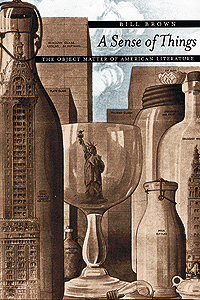Brown’s Sense of Things garners Press’ Laing Prize
By Jennifer CarnigNews Office
 Bill Brown | |
At its award ceremony Thursday, April 27, the University Press presented the 2005 Gordon J. Laing Prize to Bill Brown, Chairman of English Language & Literature and the Edward Carson Waller Distinguished Service Professor, for his book A Sense of Things: The Object Matter of American Literature.
Awarded annually to a University faculty member, the Laing Prize has been given by the Press since 1963 to an author, editor or translator of a book published during the preceding three years that adds the greatest distinction to the list of the University Press. It is named for Laing, who served as Editor of the Press for more than 30 years and established its reputation as the premier academic publisher in the United States.
In A Sense of Things, Brown explores the roots of modern America’s fascination with things and the problem that objects posed for American literature at the turn of the century. Through a study of writers such as Mark Twain, Frank Norris, Sarah Orne Jewett and Henry James, Brown looks at what influential authors in that time period had to say about why and how Americans use objects to make meaning, to make or remake their images, to organize their anxieties and affections, to sublimate their fears and to shape their wildest dreams.
“What I say in this book is that people’s attachment to objects isn’t reducible to consumer culture,” Brown said, explaining that objects can hold the power to make meanings.
Even absent objects, as in the monarch’s Great Seal in Twain’s The Prince and the Pauper, can hold the same power, he said, illustrating that in the United States in the 1890s, a new intimacy emerges between people and things. “It creates something called culture,” he said.
In the introduction, Brown explains that the book is about “the slippage between having (possessing a particular object) and being (the identification of one’s self with the object).”
“It is a book about the indeterminate ontology where things seem slightly human and humans seem slightly thing-like,” he continues. “In other words, this is a book about humans and things that tracks the metamorphosis of the one into the other, but not a metamorphosis fully explained by the so-called reifying effects of a society permeated by the commodity form.”
 Cover illustration: “The Giant Glass Industry.” Scientific American, April 1909. | |
Americans, Brown argues, began using things to think about themselves.
In his four-part study of the tyranny of things, the nature of things, regional artifacts and the decoration of houses, Brown looks at how material culture imprinted values on the literary imagination, and what literature has to say about human relations to the material world.
Brown calls works such as McTeague, The Golden Bowl and The Country of the Pointed Firs, “windows on which to lean and to look out, to catch a glimpse of how the materialized world begins to shift.”
While Brown’s book focuses squarely on the few years around the turn of the century, his book strikes a strong contemporary chord, particularly in the coda, which was written in the days just before and after 9/11.
In the coda, Brown writes extensively on The American Scene, the 1907 book by Henry James in which buildings speak and express a desire to be lived in and a longing to endure. But James also mourns the building of skyscrapers in New York because their creation means that other buildings must first be torn down.
“It’s really a commentary on people’s investment in buildings and how they look at themselves,” he said of the James book. “It wasn’t until the events of 9/11 and watching people mourn the towers more than they were mourning the people in the towers that that section became clear to me. I do think it holds some resonance for readers today.”
Brown came to the University in 1989 as an Assistant Professor, having earned degrees from Duke University (B.A., ’80) and Stanford University (M.A.,’82, Ph.D., ’89). He also has written The Material Unconscious: American Amusement, Stephen Crane and the Economies of Play (1996) and the editor of Things, a special issue of Critical Inquiry collected into a book (2001), and Reading the West: An Anthology of Dime Novels (1997).
Brown is currently working on his next book, Objects, Others and Us, a further collection of essays on things, ranging from Virginia Woolf’s treatment of a piece of beach glass to a Charlie McCarthy doll.
![[Chronicle]](/images/sidebar_header_oct06.gif)